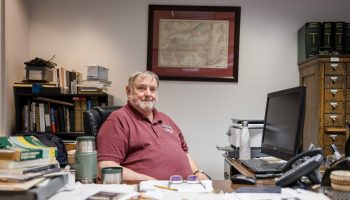
Kaitlyn Finchler
Contributing Writer
The Abrahamic faiths — Christianity, Judaism, Islam — all come from the same land. When said land is still fought over centuries later, many religious and thought leaders wonder how much religion plays a role in conflict.
Rabbi Justus Baird, senior vice president at the Shalom Hartman Institute — a research and educational center serving Israel and world Jewry, according to its website — will deliver his lecture “When a Minority Participates in History” at 2 p.m. today in the Hall of Philosophy for the Week Six Interfaith Lecture Series theme “Religion’s Role in Conflict and Extremism.”
“We’ve all been watching the conflict between Israel and Hamas, as well as the very public debates that have been going on about it,” Baird said. “I’m going to try to put those issues into a larger perspective and a Jewish perspective.”
The debates are “raging” not only between pro-Israel and pro-Palestinian factions, but among religious groups in general, as well as between Jews and Israelis.
“I want to offer some ideas, some ways to think about and maybe better understand what is happening,” Baird said. “One key framework I’ll explore is power and vulnerability.”
The ideas of both wielding power and navigating vulnerability are “really driving” Jewish and Israeli thinking and behavior, he said.
“If you don’t take into account both of these at the same time, it’s hard to make sense of what is happening,” Baird said. “I also want to explore the theme of the week about religion and violence by offering a hypothesis for why I think the conflict between Israelis and Palestinians has continued for so long and why it might continue for a while longer, and what it might take to transform it.”
Different people have different frameworks for resolving what they believe the Israeli and Palestinian conflict is about, Baird said. Some people may think it’s about religion, land or history.
“Based on some of the teachings of some people that I respect, I think it’s true about not having a shared story,” he said.
While it’s “certainly true that” there are religious people — Jews, Muslims and Christians — in the region who look at their tradition and see it as a way of promoting peace, Baird said there are also people in those traditions who have said it’s right to push others out and fight to the point of excluding everyone else.
“Anyone who thinks that is definitely not paying attention to what’s going on,” Baird said. “You can’t really break through by using religion only because, ultimately, religion is involved in it, but it’s not the only driver — it’s probably not even the primary driver. It’s being used by the multiple sides to push things in their direction.”
As the birthplace of the Abrahamic traditions, Baird said, the region holds a “special place” in the hearts of many Americans of faith.
“Here at Chautauqua, it’s my first time here in the summer,” he said. “Earlier today, I saw Palestine Park as another example of, even at the very beginnings of this particular community, there was a sense of trying to connect to that region and to that Holy Land. I feel it’s probably appropriate to continue to do so today.”
Baird said he hopes the audience comes away with some suggestions for how to have conversations about conflict in the region in productive ways.
“I hope that the audience comes away with some new ways of thinking about what’s going on in the region,” Baird said. “I hope that they come away with some new ways to think about the political conflicts here in America, as well, because I think that similar things are driving the political conflicts that we’re navigating here in our own country.”




